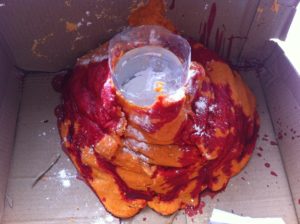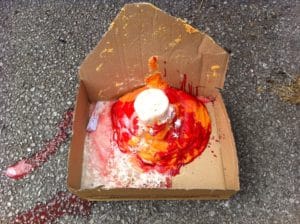22 June 2013
The volcano experiment
KS3 students at our Huddersfield tuition centre perform a science experiment using a volcano made from dough (flour and water) and then filled with baking soda (sodium bicarbonate) to which vinegar (acetic acid) was added.


What’s happening?
The baking soda is a base while the vinegar is an acid. When combined they react together to form carbonic acid, which is very unstable and instantly breaks up in to water and carbon dioxide creating all the fizzing as it escapes the solution. Super!
CH3COOH + NaHCO3 –> NaCH3COO + CO2 + H2O
Acetic acid + Sodium bicarbonate –> Sodium acetate + Carbon dioxide + Water
You can try this experiment at home if you like, but make sure you get permission from an adult and ask them to help you.
What you’ll need:
1. Baking Soda (make sure it’s not baking powder).
2. Vinegar.
3. A container to hold everything and avoid a big mess!
4. Paper towels or a cloth (just in case).
Instructions:
1. Place some of the baking soda into your container.
2. Pour in some of the vinegar.
3. Watch as the reaction takes place!
Have fun.

This is a wicked experiment we did at school once. Your volcano looks pretty cool as well.
Volcanoes are dramatic evidence of the powerful forces at work inside the Earth. Eruptions of ash, gas and lava destroy entire cities and kill large numbers of people.
Volcanoes also add nutrients to soils, creating perfect conditions for many crops. Some types of volcano make new sections of the tectonic plates that make up the surface of the Earth. Without volcanoes and our planet’s plates, the dry land we live on would not be renewed, and weathering and erosion by water, wind and ice would eventually carry it all into the oceans leaving Earth a water world.
There are three common types of volcano: composite volcanoes, often the most deadly; shield volcanoes, which are large but generally less violent; and cinder cones.
I tried this at home but cannot get my experiment to work. Please help me. I want my volcano to explode with lava. Why does science have to be so complicated?
Hello.
Educate First is just wicked. We both love it.
Bye.
How did you get this experiment to work? What goes inside to make this happen? I need to do something like this for my school project and want to build something similar but I need some help as I am not good at science but I want to be a scientist when i grow up because i find science amazing and fun.
Good to see kids taking an interest in science experiments outside of school. This is great stuff. Practical ways are the best for kids to learn and also appreciate the outside world.